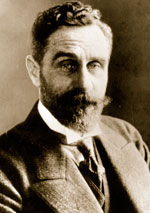Sir Roger David Casement

Irsk oprørsleder. Blev landsat af tysk ubåd i Irland, men taget til fange af englænderne og henrettet.
- Dublin, 1916
Casement, Sir Roger (1864-1916), irsk uafhængighedsfører. Rejste i forretningsanliggender til Vestafrika, blev konsul i Lourenzo Marques 1895-98, i Congostaten 1898-1904, i Santos i Brasilien 1906-08 og generalkonsul i Rio de Janeiro 1909-13, da han forlod udenrigsministeriets tjeneste af helbredshensyn. Deltog derpå i irsk politisk virksomhed og agiterede ved verdenskrigens udbrud i de Forenede Stater for, at irerne ikke skulle deltage i krigen mod Tyskland. Kom november 1914 til Tyskland, hvor han fik adgang til de engelske fangelejre og søgte at danne en irsk brigade til kamp mod England. Et tysk rygte påstod, at den engelske gesandt i Kristiania (Finlay) havde planlagt et mordforsøg mod ham. 20. april 1916 landsattes Casement på Irlands vestkyst fra en tysk ubåd, men hans våbenskib S/S »Aud« blev opbragt og han selv fanget, mens oprøret i Dublin 24. april hurtigt kuedes. Casement blev anklaget for højforræderi, dømt og efter forgæves appel hængt 4. august. (HK2/1920)
Britisk forræder og irsk nationalhelt, blev hængt af briterne i midten af 1916 for sin andel i samarbej-det med Tyskland og irske nationalister i planlægningen af Påskeopstanden i Dublin i 1916.
Casement blev født den 1. september 1864 som søn af en protestantisk fader og katolsk moder og gjorde i mange år .... Casement served for many years as a distinguished British Consul in Mozambique, Angola, the Congo Free State and Brazil.
He gained international renown for his Consular reports criticising the treatment of native workers in the Congo and Amazon. As a consequence of his reports Belgium notably overhauled its administration of the Congo in 1908. Casement himself was rewarded with a knighthood in 1911, the same year he retired from the diplomatic service in ill-health and established himself in Dublin.
Casement helped to form in 1913 the Irish National Volunteers, a nationalist organisation. The following year, in July 1914, Casement visited New York in an attempt to garner support for the organisation. With the outbreak of war the following month Casement similarly hoped for German assistance in gaining Irish independence from Britain.
With this in mind Casement travelled to Berlin in November 1914; once there however he found the Germans reluctant to undertake the risk of sending forces to Ireland. He was also disappointed in his hopes of recruiting to his cause Irish prisoners taken to Germany.
While in Germany Casement strove in particular to effectively borrow a number of German officers to assist with a planned Easter rising in Dublin; again, he was disappointed. Believing the planned rising unlikely to succeed at that stage Casement arranged to be taken by German submarine to Ireland where he hoped to dissuade nationalist leaders from undertaking rebellion for the present.
Consequently he was landed near Tralee in County Kerry on 12 April 1916. Twelve days later he was arrested by the British, taken to London, and charged with treason. At about this time copies of a diary (the 'Black Diary') reputed to be written by Casement were circulated among government officials, detailing alleged homosexual practices with native boys.
Although clearly an attempt by the British to discredit Casement the diaries' authenticity was verified by an independent panel of scholars in 1959 and, more recently, in 2002. With an appeal dismissed Casement was taken to Pentonville Prison in London where he was hanged on 3 August 1916.